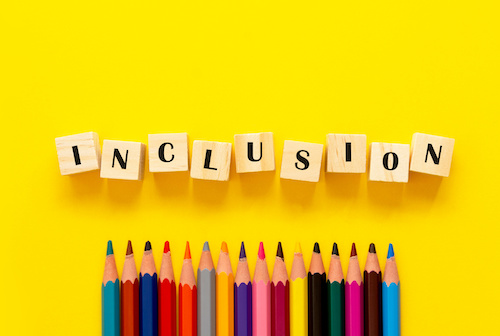Key points:
- Inclusive learning can lead to improved academic outcomes for students with disabilities and their peers
- Advancing educational equity with UDL and generative AI
- How to work for equity of access in classrooms
- For more news on inclusive classrooms, visit eSN’s Educational Leadership page
The Individuals with Disabilities Act (IDEA), passed in 1975, ensures that eligible children with disabilities receive free public education along with the services they need to succeed. The IDEA act also guarantees that students with disabilities have the right to engage in the Least Restrictive Learning Environment (LRE) that best meets their individual needs.
The LRE ensures that students under IDEA are offered equitable access to education alongside their non-disabled peers. Under these requirements, special education students should be in the same classrooms as their peers to the maximum appropriate extent. The goal isn’t to make sure that special education students are in the mainstream classroom as much as possible, but to allow students to engage in a classroom setting that is the most beneficial to their academic success and development and to have equal opportunities to their peers. This requires some training for educators on how to create more inclusive classrooms.
Strategies for educators to support inclusive learning
Inclusive classrooms are classrooms where students with diverse abilities and backgrounds learn together in a mainstream classroom setting. To maintain an inclusive learning environment, it is critical that educators have effective strategies to ensure that all students, regardless of their abilities, are given the opportunity to thrive academically.
Here are three strategies for educators to support inclusive learning:
1. Foster a collaborative classroom culture
A collaborative classroom culture encourages students to work together and appreciate the unique perspectives that their peers bring to the table. Educators can create this culture through tactics such as group projects or peer tutoring programs. Other activities like circle time, where students have the opportunity to share their thoughts and experiences, can also help foster mutual understanding and respect. Collaboration not only helps to create a sense of community and belonging inside the classroom, it also prepares students for the real world that values teamwork.
2. Professional development
To enhance educators’ capacity to support diverse learners and inclusive classrooms, they need ongoing training and professional development opportunities. Having regular professional development training helps educators to learn more ways to best serve their students.
3. Differentiated instruction
Offering tailored teaching methods, materials and assessment strategies can help students to better understand the curriculum. Students learn in various ways, and offering materials at different difficulty levels, providing visuals or offering kinesthetic activities ensures that all students can engage in the classroom.
Why special educators are essential
Expertise
Special educators play an important role in ensuring the effectiveness of inclusive classrooms. They have the expertise, training, and resources to address the diverse needs of students, especially those with special needs.
Teaching methods and materials
In an inclusive classroom, special educators can tailor their teaching methods and materials to meet the abilities and preferred learning styles of students. This ensures that every student has access to individualized support that suits their unique needs.
IEP familiarity
Special educators are also trained to create Individualized Education Plans (IEPs) for students who have special needs. IEPs describe how a student learns, how they demonstrate what they are learning, and what educators can do to help a student learn more effectively. They are tailored using input from general and special education teachers, parents, school administrators, and the students themselves. Having an IEP can also help to determine if a fully inclusive classroom environment is the right fit for a specific student.
Behavior management
Behavioral difficulties are often a challenge in inclusive classrooms. Special educators have the necessary training to manage students with behavioral issues and can help maintain a productive learning environment in the classroom.
While special educators are important in driving the success of inclusive classrooms, they also face challenges such as being responsible for too many students.
Pros and cons of inclusive classrooms
The pros and cons of inclusive classrooms have been heavily debated and can vary with each individual circumstance or classroom.
Inclusive education has benefits for both students with disabilities and for their peers as it promotes social integration, cultivates empathy, and exposes students to those with diverse abilities. Studies have shown that inclusive education can lead to improved academic outcomes for both students with disabilities and their peers.
While inclusive classrooms have many benefits, there are also drawbacks that often dissuade schools and classrooms from adopting an inclusive classroom environment. Meeting the needs of students with varying abilities and offering individualized support can be challenging for teachers, especially in larger class sizes. Resource allocation can also be a concern because special education students often need support staff, specialized teaching materials or technology.
Inclusive classrooms are not a one-size-fits-all environment. By working with special education students alongside their peers, with an appropriate IEP in place, educators can tailor their teaching to better serve each student. While an inclusive classroom might not be the best fit for every student, every student should have the opportunity to participate in the learning environment that allows them to gain the most from their education.
- 4 ways to encourage play in education - April 25, 2024
- CoSN IT Leader Spotlight: Lisa Higgins - April 25, 2024
- It’s time to pay student teachers - April 25, 2024

